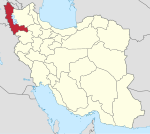Mahabad: Difference between revisions
Reverted 1 edit by 94.191.159.25 (talk); The sovereign state flag is used not regional ones. (TW) |
Escoperloit (talk | contribs) m moved Mahabad to Savoujbolagh |
(No difference)
| |
Revision as of 12:23, 25 January 2011
Mahabad | |
|---|---|
| Country | |
| Province | West Azarbaijan Province |
Mahabad (Kurdish: مەھاباد, Persian: مهاباد) is a predominantly Kurdish city in northwestern Iran or Iranian Kurdistan. The city lies south of Lake Urmia in a narrow valley 1,300 metres above sea level, in West Azarbaijan Province.
Mahabad is the centre of a rich agricultural region, but the city itself is little developed by Iranian standards. Mahabad is connected by road with Tabriz 300 km north, Urmia 150 km north and Irbil in Iraq. The city is also home of the Islamic Azad University of Mahabad.[1] The city of Mahabad has often been the center of Kurdish nationalist movements in Iran.[2]
Etymology
The origins of the name 'Mahabad' are unknown. However, some believe that the name has a connection to the ancient inhabitants of the region, the Mannaeans[3] and that the name is linked to the Persian translation of the ancient Mannaean name meaning place of moon, which is also a cognate with the Kurdish word mang. Mannaeans were a tribe of the Hurrians (Khurrites), a northern Mesopotamian people.
Mahabad is referred to in the Turkic languages as 'Savoj-bolaq', or 'Sablakh', which means "Cold-spring water".
History
Ancient History
The region of Mahabad was the centre of the Mannaeans, who flourished in the early 1st millennium BC [4]
During the Safavid dynasty, the region of Mukriyan experienced political turmoil. In 1609-1610, during the battle of "DimDim", the Mukriyan tribes of the region supported "Amir Khan Lepzerin" (Golden Hand Khan), the Kurdish ruler of Bradost. For further detail see "Iranian Kurdistan" section in Kurdistan article. (Also see [1], [2]).

Local traditions hold that there was an older Mahabad in what is today known as plain of Sharwêran (ruined city), in neighbourhood of modern Mahabad but was destroyed by the invading armies in medieval era.
Expansion of Mahabad
Mahabad remained a small town in Deryaz, until it was named the capital of the Mukriyan Emirate under the Safavid dynasty. The Kurdish prince, Budaq Sultan, ordered the construction of many noteworthy buildings in Mahabad.[5] The Mukri rule lasted until the Qajar dynasty dissolved the emirate in the middle of 19th century.
Modern Kurdish State in Mahabad
Mahabad was briefly the capital of the short-lived Republic of Mahabad, which was declared independent on January 1, 1946 under the leadership of Kurdish nationalist Qazi Muhammad. The republic received some minimal support from the Soviet Union, which occupied Iran during the same era and included the Kurdish towns of Piranshahr, Sardasht, Bukan, Naqada and Ushnaviya.[6]
After an agreement brokered by the United States, the Soviets agreed to leave Iran in which sovereignty would be restored to the Shah in 1947. The Shah ordered an invasion of the Republic of Mahabad shortly afterwards under which the leaders of the republic including Qazi Muhammad were arrested and executed.[7]
Culture
Qazi Muhammad translated more than 70 important literary works into Persian. Other writers and poets have hailed from Mahabad in the 19th and 20th century including Wafaei(1844-1902), Hejar (Abdurrahman Sharfkandi)(1920-1990), Hêmin(Sayyed Moháammad Amini Shaykho-al-Eslam Mokri)(1920-1986), Abdorrahamn Zabihi (1920-1980) and Giw Mukriyani. The first Kurdish-Kurdish-Persian Dictionary in Iran was written by Hejar. Kurdistan's national poet was the title given to Hejar(along with Hêmin) during the short lived reign of the Republic of Mahabad in recognition of his poetry's service to the cause[3].
After the fall of the Pahlavi monarchy in Iran in 1979, "Hêmin" set up the Salaha-al-Din Ayyubi Kurdish publishing house in Urmia, which published Sirwe (from spring 1985), a quarterly cultural magazine that Hêmin ran until his death in 1986.[8].
Present-day Mahabad and Human Rights
During the 1979 Islamic Revolution people who did not support the revolution clashed with its backers in Mahabad on the 3rd of September[citation needed]. Other cities in the region were also involved in heavy clashes in the political turmoil of the revolution. Many Mahabadis saw the opportunity to advance their political positions with the fall of Shah's government.
The most recent unrest in the town of Mahabad began in early July 2005, following the shooting of Shivan Qaderi. Shivan Qaderi also known as Sayed Kamal Astam, was the leader of a Kurdish youth movement in Iranian Kurdistan who organized mass protests in the region against the Iranian government.[9] Security forces ordered the arrest of Qaderi along with two other Kurdish men. Qaderi was shot and killed by security forces and his body was mutilated. Photos of Qaderi's body began appearing across the Internet and several thousands of residents in Mahabad, and later in other cities in Iranian Kurdistan, began massive protests in the streets.[10]
References
- ^ http://www.iau-mahabad.ac.ir/
- ^ http://www.iranfocus.com/modules/news/article.php?storyid=2417
- ^ Seebauer, Renate. Mosaik Europa: Diskussionsbeiträge zur ethnischen und sprachlichen Vielfalt. LIT Verlag Münster, 2006 (87)
- ^ http://www.britannica.com/eb/article-9050086
- ^ http://www.oldcarpet.com/mahabad.htm
- ^ McDowall, David (2004). http://books.google.com/books?id=1tarN6gfxX8C&dq=%22on+22+January+1946%22&lr=&as_brr=3&source=gbs_navlinks_s" "A modern history of the Kurds. I.B. Tauris. pp. 244–245. ISBN 1850434166.
- ^ McDowall, David, A Modern History of the Kurds, I. B. Tauris, 1996 (Current revision at May 14, 2004). ISBN 1-86064-185-7.
- ^ [http://www.Iranica.com/articles/v12f2/v12f2030.html
- ^ Amnesty International. Document - Iran: Detention without Charge / Fear of Torture or Ill-Treatment. http://www.amnesty.org/en/library/asset/MDE13/039/2005/en/0683bcaa-d4c7-11dd-8a23-d58a49c0d652/mde130392005en.html
- ^ Amnesty International. Document - Iran: Detention without Charge / Fear of Torture or Ill-Treatment. http://www.amnesty.org/en/library/asset/MDE13/039/2005/en/0683bcaa-d4c7-11dd-8a23-d58a49c0d652/mde130392005en.html
- Hêmin(Hemin) Mokriani in Encyclopaedia Iranica
- Short Biography and works of Zabihi
- Zabihi, Abdal Rahman, Qamusi zimanî Kurdî (Dictionary of Kurdish Language),Korî Zaniyarî Kurd Press, Baghdad Vol. I 1977.244 p. Vol. II 1979. 230 + 7 p (through letter b).
- Mukriyani, Giw, Ferhengî mehabad (Mahabad Dictionary),Kurdish-Arabic dictionary, Kurdistan Press, Hawlir (Arbil), 1961,795 p.
- Sharafkandi, Abdurrahman (Hejar or Hajar), Henbane Borîne, Ferhengî Kurdî-Kurdî-Farsî (Kurdish-Kurdish-Persian Dictionary) Tehran : Sorush Press, 1991, 1032 p.,[4]
- Article of the Monde Diplo on Mahabad (in French)
Mahabad

